Unless you’ve been living under a rock for the last eight months or so, you’ll have heard about the incredible story unfolding in the Vanarama National League this season.
In a league that has been growing stronger and stronger in recent years, two teams have blown away the opposition – Notts County and Wrexham AFC.
Due to the results over the weekend, Wrexham, owned by Hollywood stars Ryan Reynolds and Rob McElhenney, have claimed the National League title with a game to spare, collecting 110 points in doing so.
Not far behind them is Notts County, the world’s oldest professional football club, with 106 points.
For those not aware, only the league champions are granted automatic promotion to EFL League Two, with the teams placed second to seventh qualifying for the playoffs to earn the second promotion spot.
It is quite unique that a team who finishes the season with over 100 points doesn’t earn promotion, but that could be the harsh reality that awaits County, should they fail to conquer the playoffs.
Regardless of how the campaign ends in the weeks that follow, their season to date has been something special, to say the least.
This scout report will provide a tactical analysis of how the Magpies dominated the majority of their games.
We will provide an analysis of how their build-up play has allowed them to outscore everyone in the league so far, Wrexham included, bagging 116 goals.
We talk about their tactics in possession that have enabled them to collect so many points, including a look at how they have incorporated elements of positional play into their tactics: this is drip fed into each of the three tactical areas underneath the analytical microscope as these elements crop up in various areas of their game.
Luke Williams Formations
Manager Luke Williams deserves a lot of credit for getting the best out of the players at his disposal – County have several highly talented individuals, but Williams has done well to get them playing in cohesion together at such a high level on a consistent basis.
Williams hasn’t always been at the top end of proceedings in his short managerial career, though – his first job in senior management was with Swindon Town, where he rose from assistant manager to interim manager to permanent manager.
He left the club after they were relegated to League Two: Williams’ record didn’t make for nice viewing, winning just 26.7% of his 75 games in charge.
Fast forward to 2022 and Williams returned to senior management following a spell as head coach of Bristol City’s U23 squad, before taking on assistant manager roles at MK Dons and then Swansea City.
The appointment at Notts County raised a few eyebrows amongst the supporters due to his limited experience, but after 48 games in charge, he boasts an impressive win rate of 68.8%.
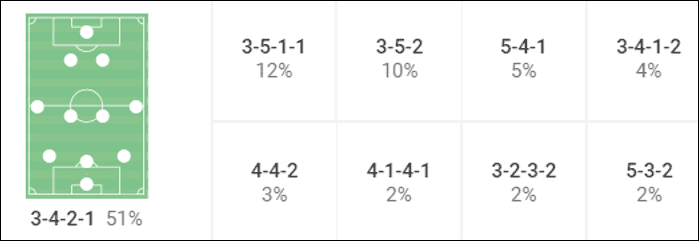
County have found a real habit of dominating possession and dictating the tempo of a match, and their preferred formation of 3-4-2-1 plays nicely into that.
They have recruited smartly in recent years, bringing in players that complement the style of football they want to accomplish.
For example, their centre-backs play important roles in getting the ball forward into midfield areas with players like skipper Kyle Cameron looking like a natural in such a role.
The midfield unit has players who are comfortable and composed on the ball with a clear understanding of their job in terms of progressing possession – the likes of Geraldo Bajrami and the former Tottenham Hotspur man John Bostock, for example, hold traits that go hand-in-hand with Luke Williams tactics.
In attack, their tactics and shape allow for a lot of positional fluidity – you will often see the deeper midfielders pop up in more advanced areas, whereas the attacking midfielders have the license to take up varying positions – from wide areas to playing alongside goal machine Macaulay Langstaff.
In times where they opt for a shape that lines up with two strikers, Cedwyn Scott, who has 14 goals himself this season, will often lineup alongside Langstaff, both formerly of Gateshead.
Rúben Rodrigues, who has 17 goals and 14 assists this season, enjoys a creative role behind the striker(s), although he is occasionally tasked with playing as a frontman himself.
County have a cluster of other names who have contributed greatly this season, these players are just examples of some of the fantastic individual talent on display at Meadow Lane.
Utilising possession domination
In the 45 games they’ve played at the time of writing, County have averaged 69.1% possession per 90 minutes, a mouth-watering figure that tells you just how often they are used to controlling games – credit here obviously goes to the players but also Williams for coaching the squad the intricate details involved: the players clearly buy into his philosophy.
One thing that makes Notts County stand out from lots of other possession-based teams is their clinical nature in the final third.
They have the capacity to increase the tempo in the blink of an eye to catch the opposition off guard, or they can locate and exploit spaces around the box that the opponent has failed to defend.
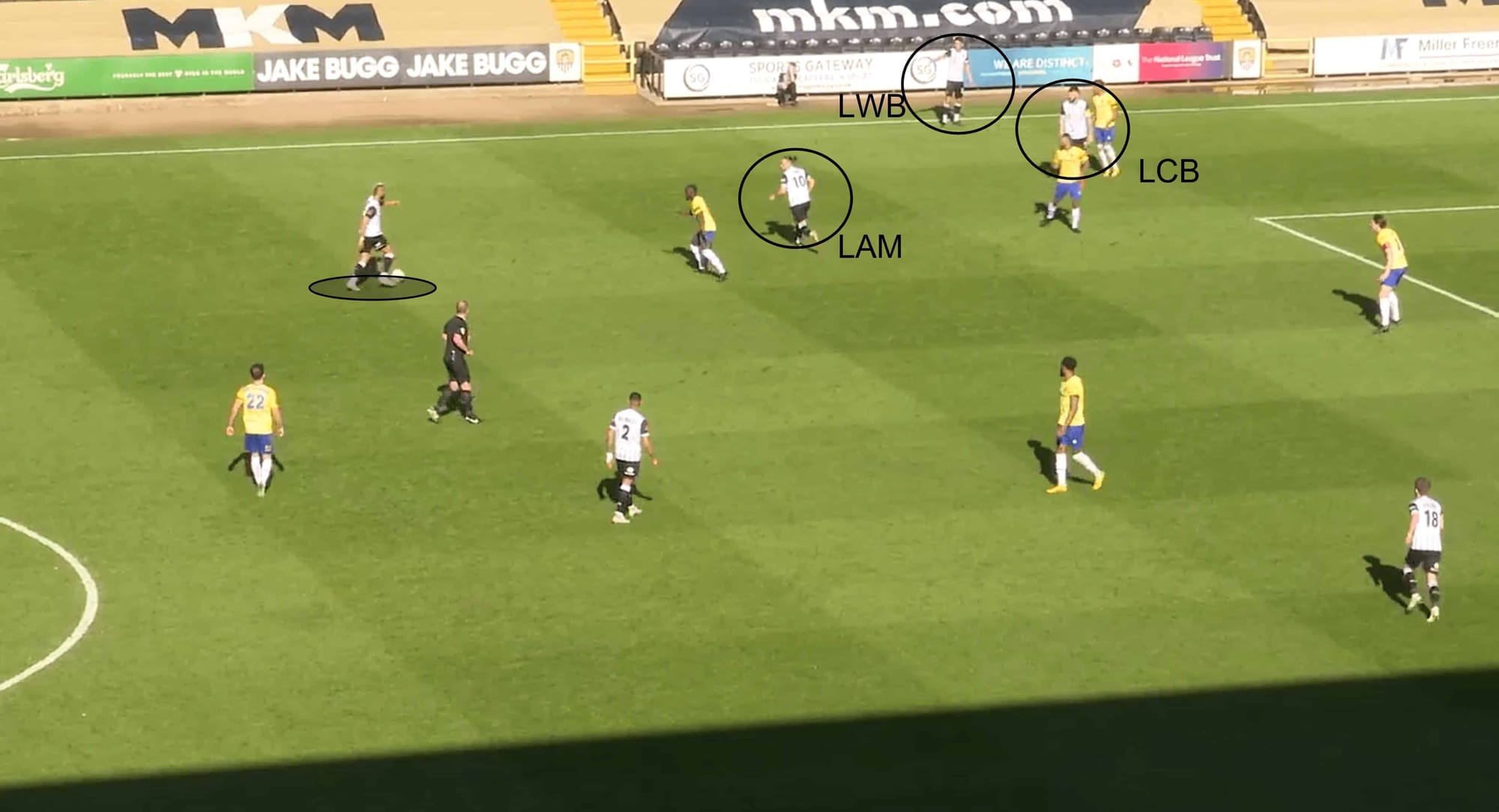
Rotation is one of the key principles of positional play, and it refers to the interchanging of positions between multiple players.
Notts County have blended that into their attacking tactics, particularly in wide areas, as we can see above.
The left wing-back, Adam Chicksen is higher than the LAM Jodi Jones, but Jones is located in a narrower position than Chicksen.
This relationship will be looked at more closely later on in the analysis, but the purpose of its inclusion here is to highlight the movement when County look to dominate possession in isolated areas on the flanks.
In a nutshell, if the wing-back is wide, the attacking midfielder will be tucked inside, and vice versa.
Not only that though, notice how Kyle Cameron, the LCB in this case, is involved in this flank overload.
Again, we will look at County’s attacking defenders in more depth later on, but we are now focusing on how County want to get numbers in one area to draw the opposition out.
The goal here for County would be to either execute an intricate passing combination or wait until the opponent has been dragged out of position due to the presence out wide and look to exploit any space or disorganisation in opposition ranks.
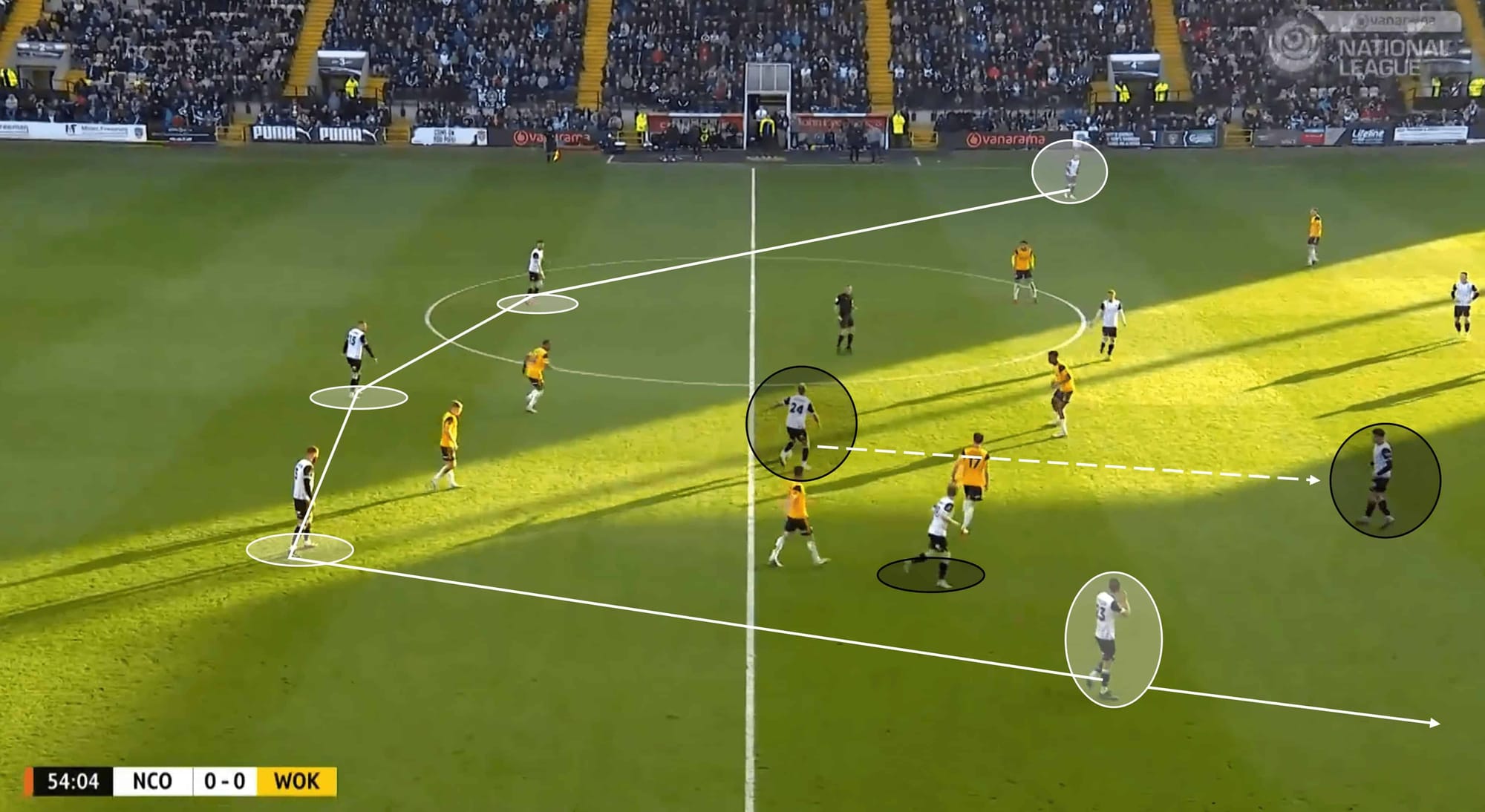
This image gives us chance to recognise a typical Notts County shape as they look to begin their attacking phase and push the opponent back.
And we start with the shape of the back three/five.
And this is also where we start to see the fluidity and the capacity to be unpredictable rather than doing the same thing over and over again – the right wing-back in this fixture was Chicksen and in the image above, he is positioned fairly narrowly for a wing-back in this shape.
There’s a chance that this detail held no significance, but there is also the chance that it held the purpose of keeping the opposition more central to open up space out wide.
Speaking of unpredictability, this move had just that.
Usually, when County have the ball in a situation like the one above, you could expect a pass that promotes a patient approach – to the LCB or even a lofted pass to the wide left-wing back.
But County have players who possess traits that can produce moments of quality and John Bostock is one of them.
The former Doncaster Rovers midfielder demonstrates tremendous vision by cutting a blind pass through the Woking midfield into Rúben Rodrigues, who found good space himself – another element of positional play: moving the opposition to make space in dangerous areas close to the ball with the intention of utilising it to further the attack.
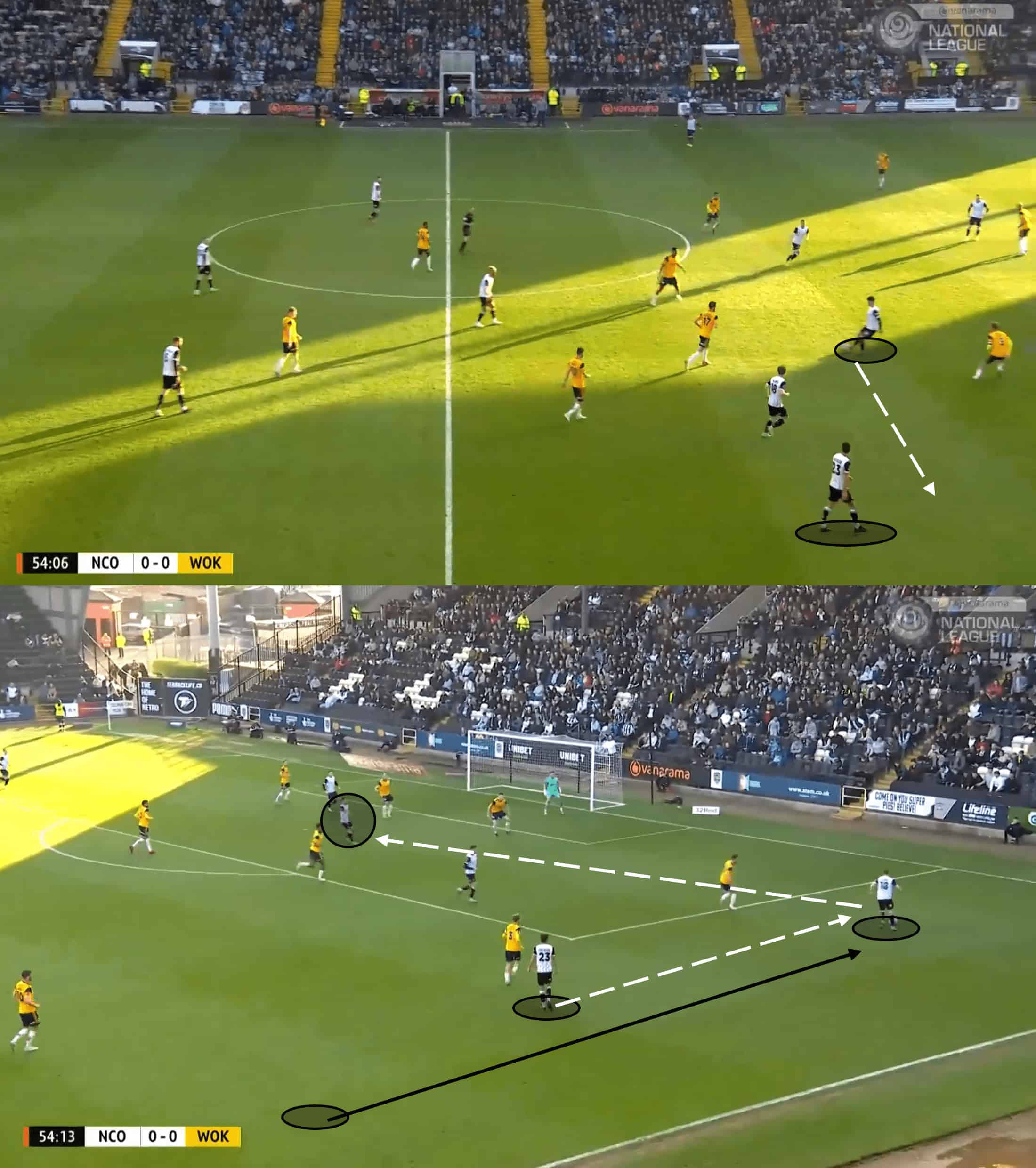
That same move led to a very well-constructed attack typical of a Notts County move.
Chicksen slowly drifted into a slightly wider position and Rodrigues was able to play a quick pass out to his wing-back who carried the ball into the final third.
As this was happening, midfielder Matt Palmer was making an overlapping run deep on the right flank, unmarked, and Chicksen showed no hesitation in using the clever run.
Palmer collected the pass and delivered an inch-perfect ground pass to Langstaff, who buried the chance.
Using Rodrigues in these types of areas where he has the ability to move into the spaces at the right time and progress the attack is a good example of qualitative superiority which is an element of positional play.
It refers to intentionally getting your highly technical/talented players into areas where they excel (and sometimes targeting weaker opposition individuals) and Rodrigues ticks that box here as he is extremely dangerous when he picks the ball up with no immediate pressure on him.
Attacking centre-backs
Defenders who are capable in possession are no rarity these days as being able to contribute to various phases of play is a standard requirement for many teams, but Notts County go one further than that.
Their possession-dominant style often forces the opposition deep into their own half, meaning County can commit more players forward, and as a result, we often see either the RCB or LCB of a back three commit forward into midfield.
This section of analysis looks at how they achieve this and what impact it has on their attacking moves.
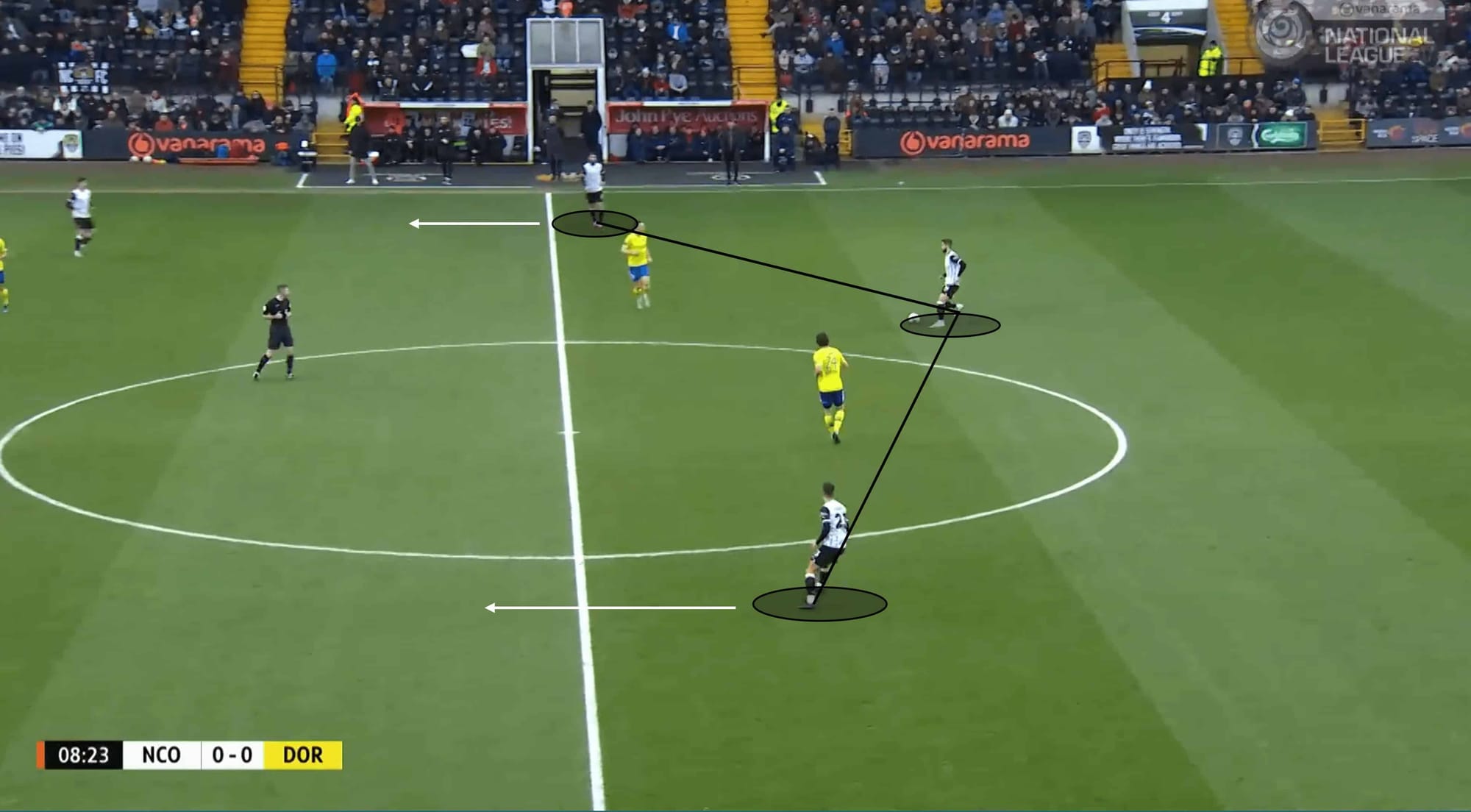
You may have noticed that the opposition in this example, Dorking Wanderers, have no presence near the halfway line apart from the two attackers – no midfielders to be seen.
This helps County in their quest to get the ball into dangerous midfield areas, something the RCB and/or LCB have a key role in.
In the early moments of the possession phase, the wider CBs will be positioned higher than the central of the three, making good angles for a pass but also opening up the option for them to carry the ball into the midfield third if and when they do receive the ball.
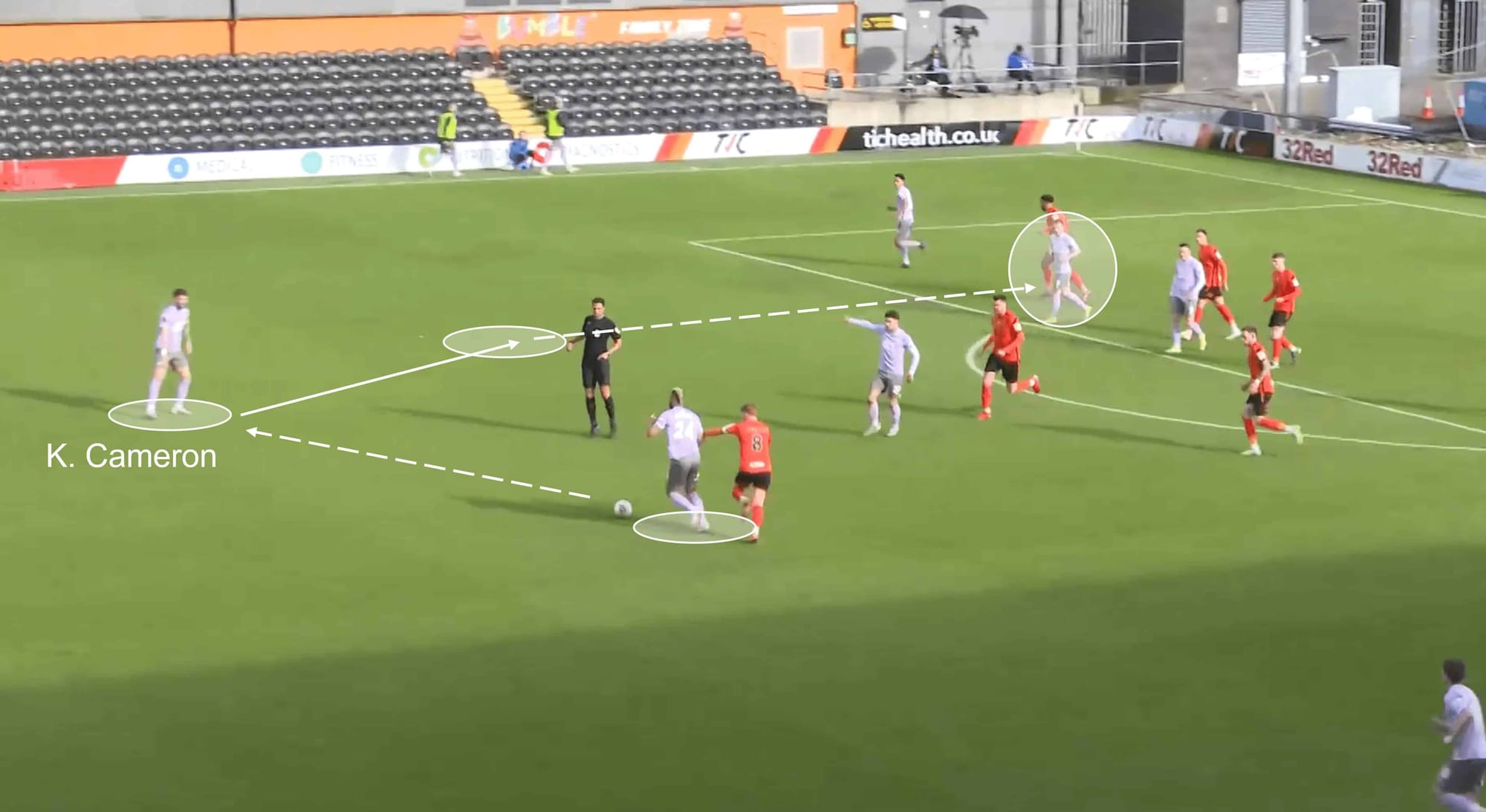
The Magpies’ defenders contributing to possession in the midfield third is no rarity.
You could likely pick any game from this season and you’ll see one of their CBs (often Kyle Cameron) in the position you see above – a part of the build-up from a midfield zone.
What is the benefit of this? Well, apart from the boost in numbers further up the pitch, they provide additional support to central midfield and are often unmarked due to the timing of their arrival, which gives them the ability to pick a dangerous pass toward the box from a better angle than the central midfielder may have had.
As mentioned, this is a regular and important feature of Williams’ tactics.
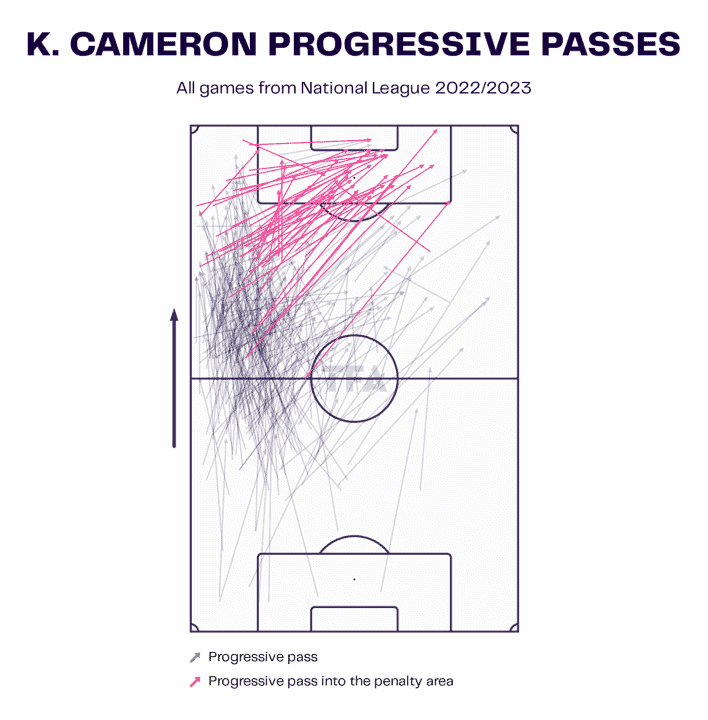
Kyle Cameron has been immense for County this season and embodies the philosophy, especially when discussing CBs contributing to attacks.
The map above shows us the progressive passes the captain has made over the course of the season.
Not only does he seem to be able to produce on a consistent basis, but he also provides a high number of these passes into the penalty area.
He’s a central defender with a knack for creating chances in the box!
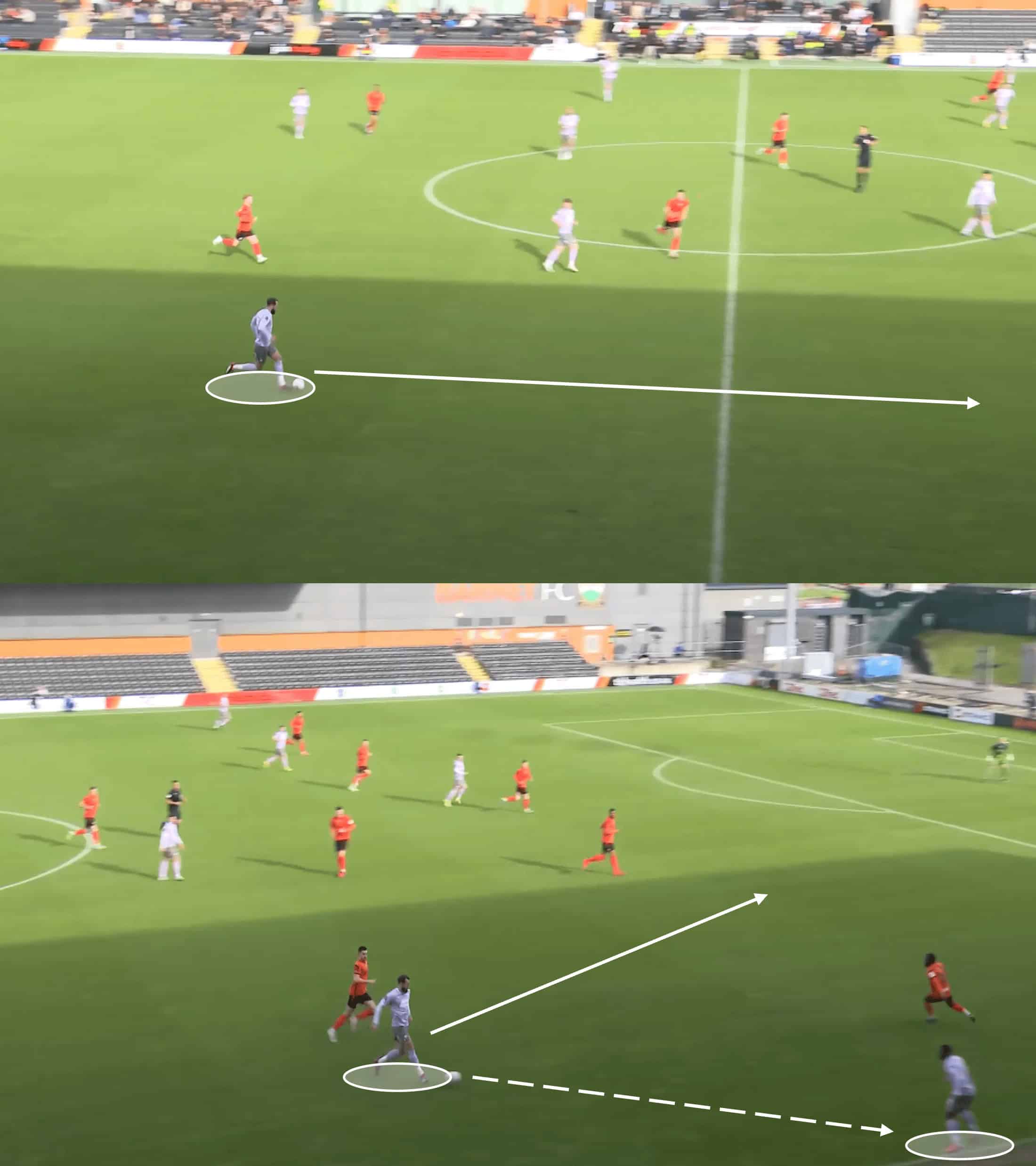
We spoke earlier about County needing to have an element of unpredictability to their play, and they even bring that into play when it comes to their CBs getting involved in attacks! The image above shows RCB Connell Rawlinson on the ball and as soon as he sees the space ahead of him, he drives into it, carrying the ball from his defensive third to the attacking third.
And this is where the high and wide wing-backs come into play as Rawlinson makes a well-timed pass out to Aaron Nemane.
Rawlinson then proceeds to make a run forward deeper into the final third, adding to County’s attacking presence.
While this isn’t as big a part of County’s tactics as the previous example, it is still something we see on occasion from the Magpies, and can help the progression of possession in quick time.
Wing-backs in attack
We mentioned how defenders in modern football need to be capable on the ball.
That rings true for full/wing-backs as well, as their attacking responsibilities have increased – more teams are using wing-backs as an important part of their attacking arsenal.
County fall into that category, often using attacking wing-backs in part of their 3-4-2-1 shape.
This analysis section looks at the relationship between the wing-back and the corresponding attacking midfielder (left wing-back and left attacking midfielder, for example), and we also look at the overall impact the wing-backs have on County’s attack.
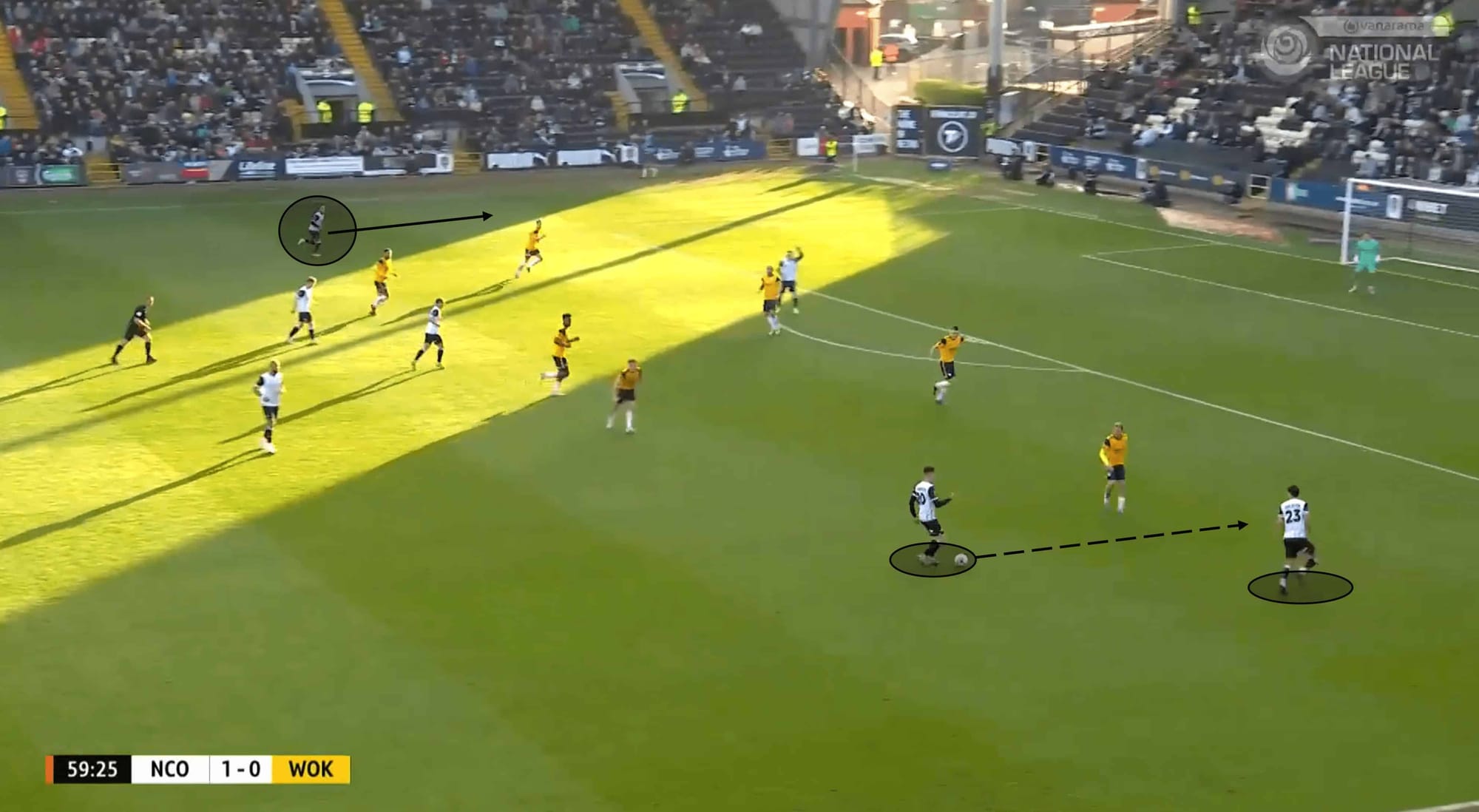
Earlier, we touched on the relationship between the wing-back and the corresponding attacking midfielder, and now, we can dive into that in more detail.
Chicksen at right wing-back shows no hesitation in getting into a highly attacking position as he makes a run that has the intention of getting past the opposition full-back.
Just a few yards to his side is Rodrigues, the aforementioned corresponding attacking midfielder.
Having these two positions close together in key moments in possession is a regular occurrence for County and often allows them to create dangerous chances from wide areas.
It is also noteworthy that the LWB on the opposite flank is also making a bursting run forward into the final third, in a wide area with no interest in remaining deeper and tucking in.
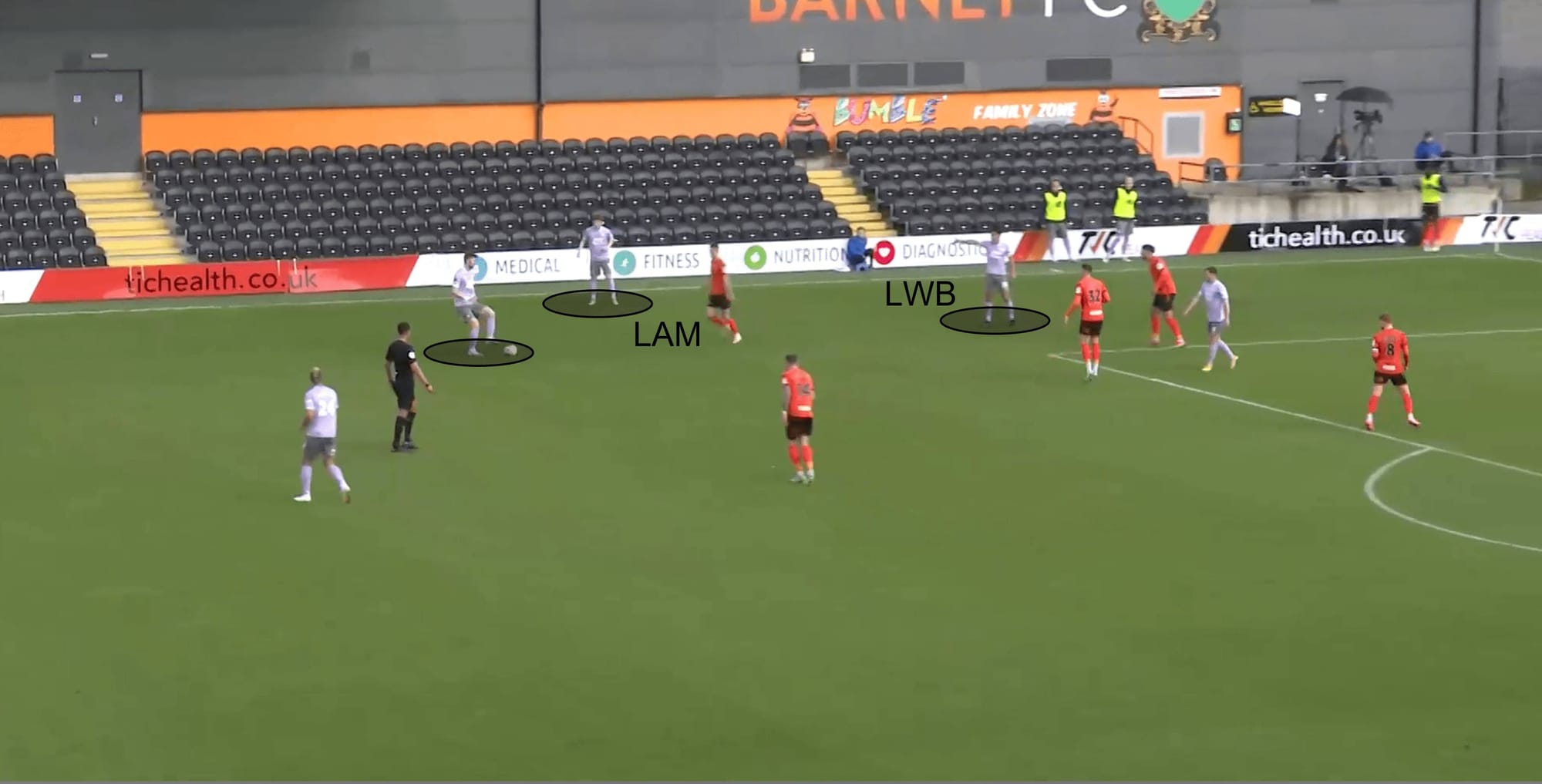
This analysis image links to one of the previous ones where we spoke about the positioning of the wing-back and corresponding attacking midfielder relying on each other.
Above, Rodrigues (LAM) is hugging the touchline yet deeper than Chicksen (LWB), who is tucked in slightly.
One of the principles of positional play is creating angles and not having players on the same line to increase the opportunities for passing combinations that can create space later in the attack, and this is what County are looking to achieve here.
They could easily have had Chicksen down the line from Rodrigues – higher up but on the same line, but the Magpies want to create angles to try and cut through the opposition to create the opportunity for a better delivery into the box.
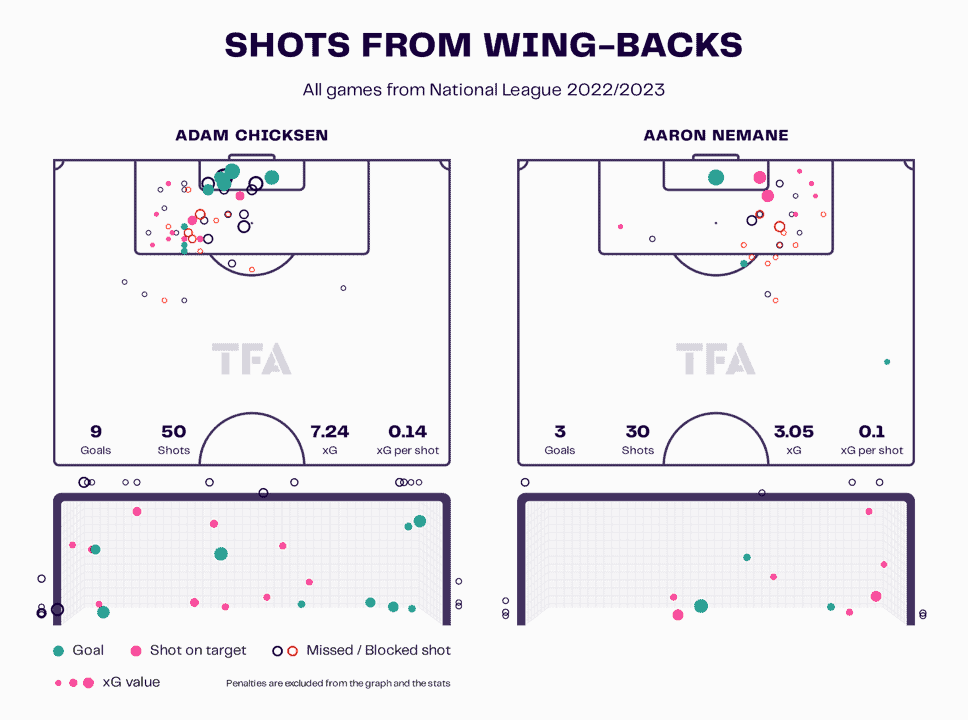
Notts County love their defenders getting involved in attacks, and their wing-backs have really bought into that.
While this is influenced by the formation, there are no wingers ahead of them.
They are the full-backs in defence but wingers in attack, essentially.
The map above shows us just how aggressive their wing-backs can be in attack.
Chicksen is their most regular left wing-back, while Aaron Nemane is their most regular right-wing back, and as the map shows us, they aren’t afraid of trying their luck on goal.
12 goals between them is some feat and plays into the fact that Notts County have goals coming from several areas of the pitch.
Conclusion
Notts County will be bitterly disappointed to miss out on the National League title despite their ridiculous points haul, but that simply shows how good Wrexham have been.
While form often goes out of the window in the play-offs, Notts County will take comfort from the fact they have finished the season in strong fashion and have a good record against other teams in the play-offs – they are unbeaten this season against the other teams fighting for play-off triumph.
County will fancy their chances – if they can control a game like they so often do and get their wing-backs and centre-backs involved then the opposition will be severely limited in terms of chances to hurt Luke Williams’ side.

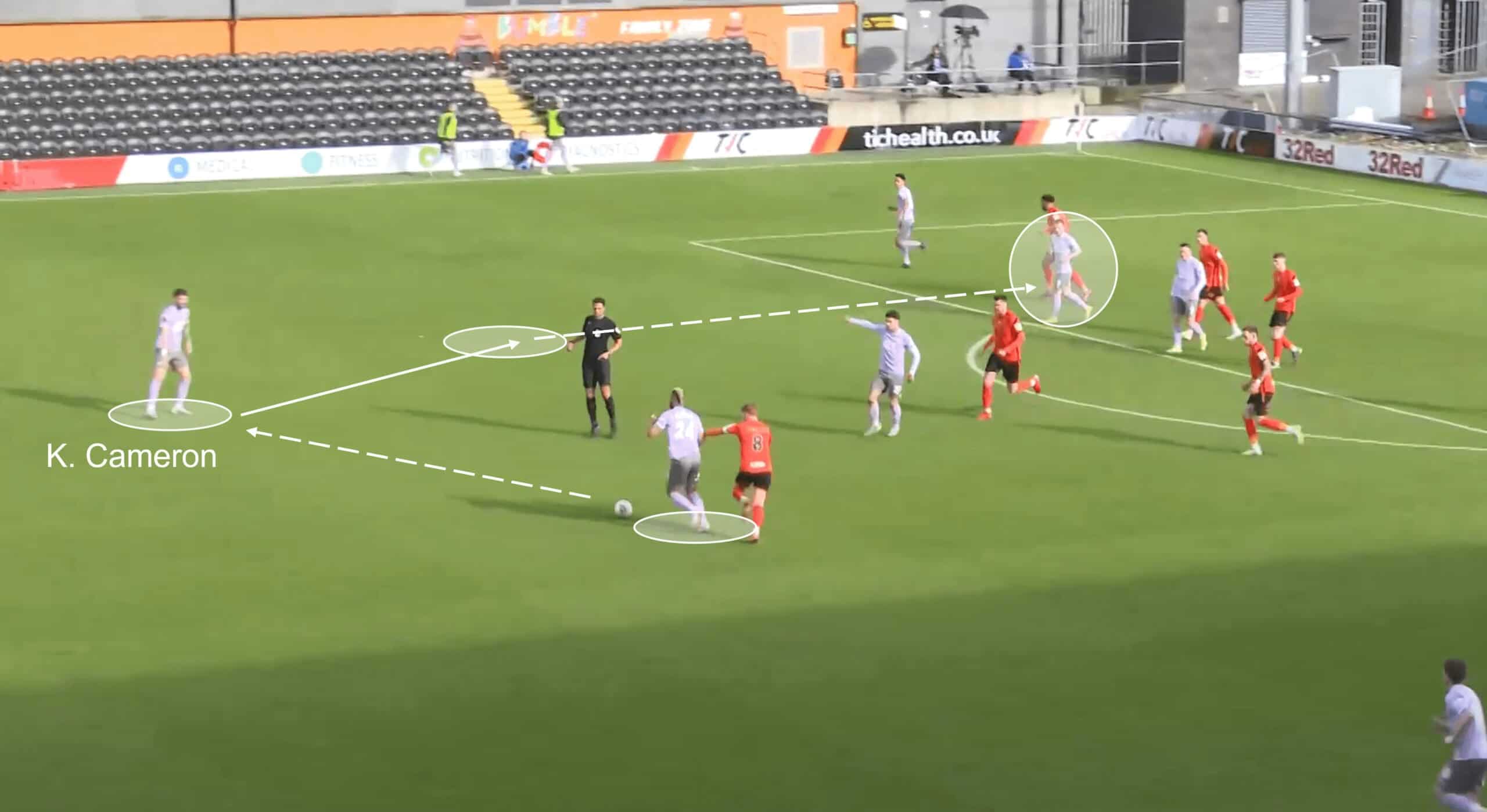




Comments